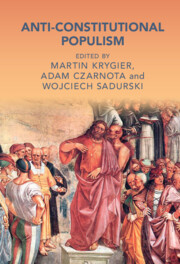Book contents
- Anti-Constitutional Populism
- Cambridge Studies in Law and Society
- Anti-Constitutional Populism
- Copyright page
- Contents
- Figures
- Contributors
- Acknowledgements
- Introduction: Anti-Constitutional Populism
- I Populisms
- II Courts
- III Anti-Constitutionalism After Post-Communism
- Chapter 8 Conservative Populism in Defiance of Anti-Totalitarian Constitutional Democracy
- Chapter 9 Constitutional Populism and the Rule of Law in Poland
- Chapter 10 Populism or Authoritarianism? A Plaidoyer Against Illiberal or Authoritarian Constitutionalism
- IV Eu Responses
- V Concluding Reflections
- Index
- Cambridge Studies in Law and Society
- References
Chapter 10 - Populism or Authoritarianism? A Plaidoyer Against Illiberal or Authoritarian Constitutionalism
from III - Anti-Constitutionalism After Post-Communism
Published online by Cambridge University Press: 24 March 2022
- Anti-Constitutional Populism
- Cambridge Studies in Law and Society
- Anti-Constitutional Populism
- Copyright page
- Contents
- Figures
- Contributors
- Acknowledgements
- Introduction: Anti-Constitutional Populism
- I Populisms
- II Courts
- III Anti-Constitutionalism After Post-Communism
- Chapter 8 Conservative Populism in Defiance of Anti-Totalitarian Constitutional Democracy
- Chapter 9 Constitutional Populism and the Rule of Law in Poland
- Chapter 10 Populism or Authoritarianism? A Plaidoyer Against Illiberal or Authoritarian Constitutionalism
- IV Eu Responses
- V Concluding Reflections
- Index
- Cambridge Studies in Law and Society
- References
Summary
In an infamous speech delivered on July 26, 2014, the populist and autocratic Prime Minister Viktor Orbán proclaimed his intention to turn Hungary into a state that ‘will undertake the odium of expressing that in character it is not of liberal nature’. Citing as models he added:
We have abandoned liberal methods and principles of organizing society, as well as the liberal way to look at the world … Today, the stars of international analyses are Singapore, China, India, Turkey, Russia … and if we think back on what we did in the last four years, and what we are going to do in the following four years, then it really can be interpreted from this angle. We are … parting ways with Western European dogmas, making ourselves independent from them … If we look at civil organizations in Hungary … we have to deal with paid political activists here … [T]hey would like to exercise influence … on Hungarian public life. It is vital, therefore, that if we would like to reorganize our nation state instead of it being a liberal state, that we should make it clear, that these are not civilians … opposing us, but political activists attempting to promote foreign interests … This is about the ongoing reorganization of the Hungarian state. Contrary to the liberal state organization logic of the past twenty years, this is a state organization originating in national interests.1
Liberalism gave rise to political correctness—that is, to a form of totalitarianism, which is the opposite of democracy. That’s why I believe that illiberalism restores true freedom, true democracy.2
- Type
- Chapter
- Information
- Anti-Constitutional Populism , pp. 366 - 398Publisher: Cambridge University PressPrint publication year: 2022



